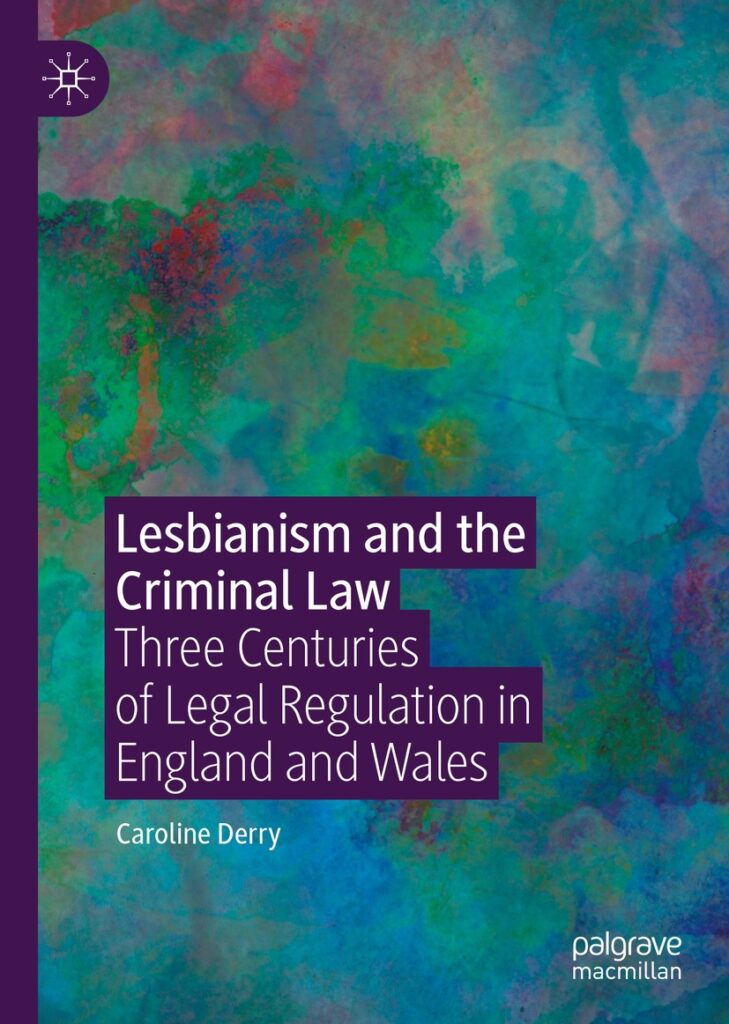Caroline Derry
Lesbianism and the Criminal Law explores how the criminal law of England and Wales has addressed lesbianism from the eighteenth century until today. Each chapter uses a different case study – including court cases, parliamentary debates, and the Wolfenden Committee – in a combination of legal, political, social and sexual history. It will appeal to readers interested in how gender, sexuality, ethnicity and class shape and are shaped by the criminal law – and it doesn’t require any prior legal knowledge. Overall, the book disproves the myths that lawmakers weren’t concerned about lesbianism and that there is therefore no lesbian legal history.

NOTCHES: What drew you to this topic, and what questions do you still have?
Caroline Derry: As a lesbian and a criminal lawyer, I was curious about my own legal history. There was very little to be found, with many authors noting the lack of a specific offence and leaving it at that. And of course, there is the enduring myth that lesbianism was not a crime because Queen Victoria didn’t believe women did such things. I am not the first person to debunk it, but it is very slow to die!
Probably the biggest question left for me is: what about the cases we have lost? There must be more which have disappeared because records were not made or kept, as well as some still to find in the archives. Surviving records are very difficult to discover because there is no specific offence or keyword to search – and that was not accidental. Lawmakers made great efforts to silence the possibility of lesbianism, as a strategy for controlling it, particularly among British women of their own class. Courts made efforts to obscure the sexual conduct at the heart of these cases, not least by using a range of non-sexual offences such as vagrancy, fraud, or breach of the peace.
NOTCHES: This book engages with histories of sex and sexuality, but what other themes does it speak to?
Derry: Gender is a major theme, and one thread is the relationship between women’s legal status and their position in wider society. The silencing of lesbianism only worked as a legal strategy because of substantial constraints upon women’s agency, including the pervasive social, medical and economic regulation of their lives. Those constraints varied significantly in the ways they affected different women at different times. For example, middle-class, white, British Victorian women were expected to be ‘innocent’, but foreign and working-class women were viewed as a source of ‘corruption’. Thus lesbianism was constructed as a foreign or lower-class contagion from which respectable women could be shielded.
The book also considers the implications of a specific, small section of society – white, higher-class men – having the power to make and implement laws which regulated women’s most intimate lives. One key consequence was that lawmakers constructed lesbianism as a matter of privileged male knowledge, which they could withhold from (‘respectable’) women themselves. It is only in the last century that women could become lawyers and MPs; even so, the 1921 debates on criminalising ‘gross indecency between females’ were conducted with just one woman MP sitting in the House. Worse, she did not speak in those debates for fear that doing so would threaten the legislation she supported.
However, as the final chapters explore, feminist advances including the entry of women into public life did not magically solve these issues. Parliamentary attitudes to sex between women have changed enormously in the hundred years since the 1921 debates – the book tracks these through the Wolfenden Report, section 28 and equal marriage as well as sexual offences laws. Yet the criminal law in this area has proved remarkably slow to reflect wider social changes, and some of the themes I consider in relation to eighteenth-century prosecutions are also apparent in recent cases.
NOTCHES: How did you research the book?
Derry: Researching this area is difficult because silencing and the lack of specific offences mean that there are no obvious keywords or paper trails to follow. As a result, the research was a bit like a treasure hunt: lots of looking for clues in the secondary literature and in digital resources such as newspaper databases, followed by plenty of searching in the archives. Legal records at their best are a rich source which includes the witnesses’ own voices, albeit heavily mediated by the court process. Unfortunately, many don’t survive at all or are very sparse. And while lesbians being talked about by powerful men is obviously central to a history of regulation, it is frustrating that the views of judges, parliamentarians, and male witnesses to the Wolfenden Committee are recorded, while the perspectives of lesbians are not.
NOTCHES: Whose stories or what topics were left out of your book and why? What would you include had you been able to?
Derry: I had to leave out almost all the stories which didn’t directly involve criminal prosecution of supposed lesbianism. That meant saying relatively little about some of the best-known lesbian legal history: for example, in the Well of Loneliness case the publisher, rather than the author Radclyffe Hall, was prosecuted. And because the book was about England and Wales, I couldn’t include much about Marianne Woods and Jane Pirie v Dame Helen Cumming Gordon, a Scottish case from the 1810s. That also wasn’t a criminal prosecution, although it has a lot to tell us about attitudes to lesbianism at the time: the pursuers were two schoolteachers who brought a libel case against their aristocratic patron when she turned against them and effectively closed down their school. It was only during the legal proceedings that they found out they had been accused of having sex with each other.
NOTCHES: Did the book shift significantly from the time you first conceptualized it?
Derry: Yes and no. It grew (very slowly) out of my PhD research, so I had an idea of the general shape of the book and its core arguments. However, my thinking has been influenced by wider developments in the history of sexuality, for example more nuanced understandings of the relationship between lesbian and trans histories. I’ve looked much more at the twentieth century in the book than I had previously, which has added a lot of depth. Recent legal developments have also had an effect: when I started researching, the Sexual Offences Act 2003 was new, removed most overt discrimination from the criminal law, and promised a real shift in legal understandings. That promise has not really been kept, as the final chapter explores – and that has also made me reconsider the significance of earlier events. I now argue that the Wolfenden Report, for example, was a landmark in the relationship between lesbianism and the criminal law.
NOTCHES: How did you become interested in the history of sexuality?
Derry: I was always interested in history, so when I came out in the early 1990s, I read everything I could on lesbian history (as well as the history of sexuality more broadly). I was also studying law, so I took particular note of the few legal bits and wanted to learn more. Given all the difficulties of finding sources on lesbianism in the archives, those works and the ones which followed have been invaluable in pointing me to where, as well as how and why, to look. Of course, the field has grown immensely in the intervening decades.
NOTCHES: How do you see your book being most effectively used in the classroom? What would you assign it with?
Derry: The chapters and their case studies address some key topics in sexual history including the ‘Maiden Tribute of Modern Babylon’ scandal, sexology in the early twentieth century, and the Wolfenden Report. One pervasive theme which is perhaps particularly relevant in the classroom is how the availability of sources shapes our history – and how their absence can tell its own story. Reading the book alongside work which considers how the history of male homosexuality has been skewed by the disproportionate availability of criminal justice sources would be revealing. And on the same theme of sources, comparing my use of legal cases with that of a non-legal historian could also be interesting. For example, Alison Oram’s Her Husband Was a Woman! considers many of the cases I also discuss, but uses popular media and entertainment to chart changing social attitudes – which don’t necessarily parallel legal attitudes.
NOTCHES: Why does this history matter today?
Derry: The assumption that lesbianism does not have a legal history has sometimes been used to sideline lesbians and gender issues more generally. Hopefully this book makes a clear case for that legal history not just existing, but being important for understanding of the history of sexuality. That is vital because the history has not gone away. In some senses, it has come full circle (in one of Valerie Traub’s ‘cycles of salience’ rather than straightforward repetition). There is much discussion at the moment about ‘gender fraud’ prosecutions where sexual consent is deemed invalid because of deception as to genital sex. While the offences charged have changed, the facts are similar to those of cases prosecuted in previous centuries. Knowing that history can help us to understand what the criminal justice system is doing now, as well as why some proposed reforms are unlikely to work.
NOTCHES: Your book is published, what next?
Derry: My research is developing in two directions. First, one theme which the final chapter starts to pick up is the temporal framing of the law on deceptive consent. I’m expanding that into a larger project on legal temporalities of sexual consent. My second project is a detailed exploration of the Woods and Pirie case which I mentioned earlier. It will look not only at the importance of specifically legal understandings of the case, but also at how the case draws together so many intertwined threads of gender, sexuality, class, nationality, race and imperialism.
 Dr Caroline Derry is a Senior Lecturer in law at the Open University. She researches gender, sexuality and criminal law as well as the history of early women lawyers. Caroline qualified as a barrister, practising in criminal defence law, and as a solicitor in a large, central London legal aid practice. She then taught for fifteen years at London Metropolitan University, and has been a visiting lecturer in criminal law at SOAS and at Paris Descartes (Masters in Common Law). She tweets @CarolineDerry
Dr Caroline Derry is a Senior Lecturer in law at the Open University. She researches gender, sexuality and criminal law as well as the history of early women lawyers. Caroline qualified as a barrister, practising in criminal defence law, and as a solicitor in a large, central London legal aid practice. She then taught for fifteen years at London Metropolitan University, and has been a visiting lecturer in criminal law at SOAS and at Paris Descartes (Masters in Common Law). She tweets @CarolineDerry

NOTCHES: (re)marks on the history of sexuality is licensed under a Creative Commons Attribution-NonCommercial-NoDerivatives 4.0 International License.
Based on a work at www.notchesblog.com.
For permission to publish any NOTCHES post in whole or in part please contact the editors at NotchesBlog@gmail.com





Congratulations – the book and the research as a whole are both fascinating.
Thank you!